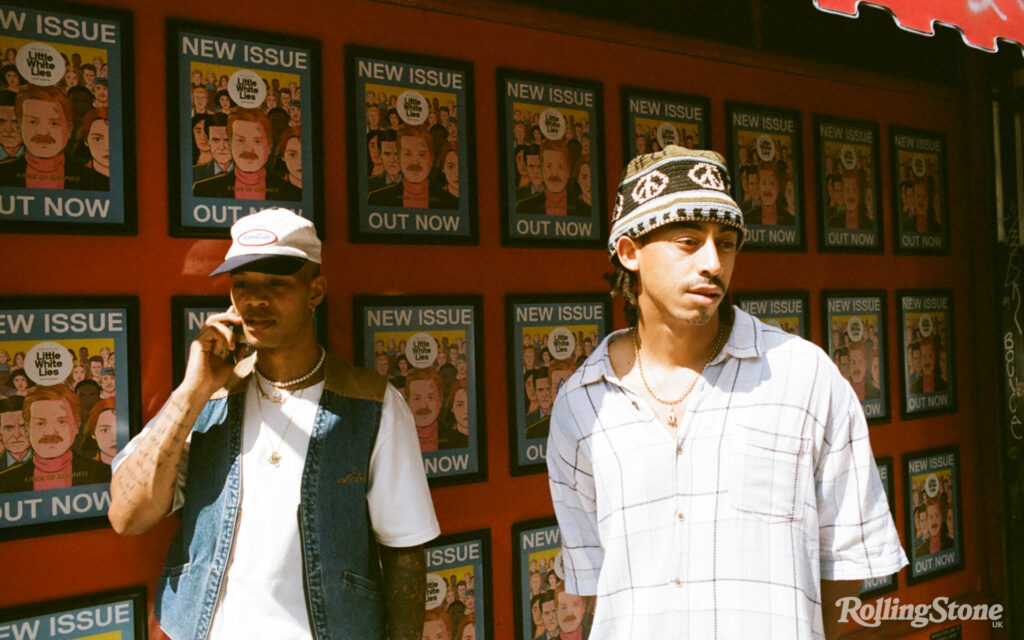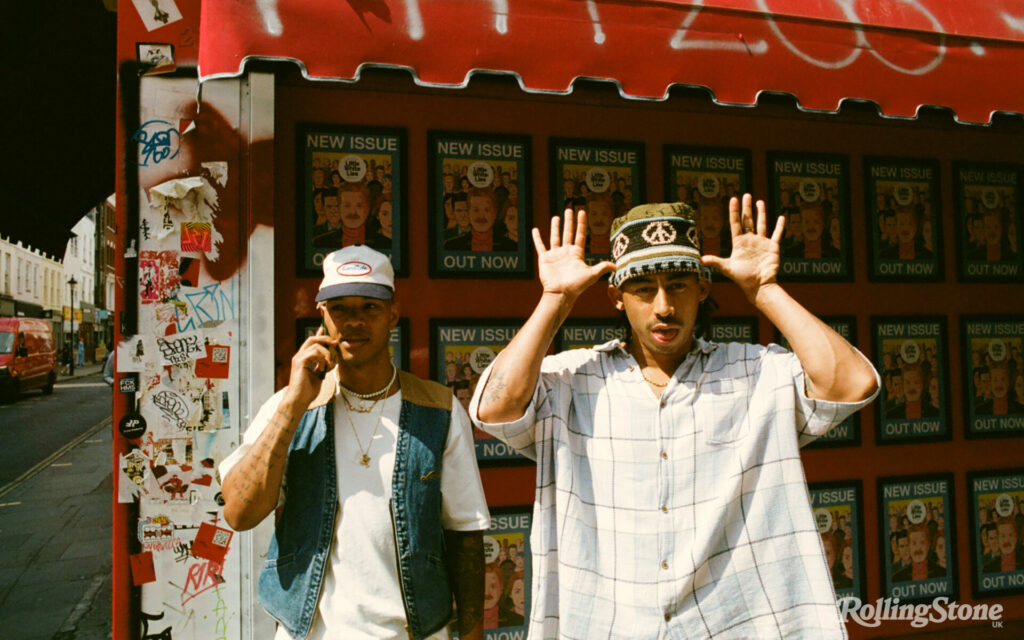Rizzle Kicks return with ‘Competition Is For Losers’: ‘We’re the best we’ve ever been’
As they return with the best album of their career, the duo tell Rolling Stone UK about hitting their thirties, sobriety and looking back on the highs of the first time round.
By Nick Reilly

“We made it to this interview in time because I got the tube and a Lime bike. So make sure you’re sticking that in the piece,” jokes Rizzle Kicks‘ Jordan Stephens on a sunny Thursday morning in late January. Well, who are we to let him down?
Stephens has arrived at the duo’s publicist’s North London office bang to the minute that we’d agreed to meet, but readily admits he’s never been the best timekeeper. The start of a new era, though, he reckons, is the perfect chance to turn over a new leaf. Today (February 14) sees the pair release Competition Is For Losers – their first album since reuniting in 2024 after more than a decade apart.
When Stephens and his bandmate Harley Alexander-Sule first arrived at the advent of the 2010s, there was a Tigger-ish, energetic charm to the pair where it felt like they were part pop duo, part children’s telly duo. This was reflected in the bouncing ‘Down With The Trumpets’ and a hit number one with X Factor alum Olly Murs on the ska-flecked beat of ‘Heart Skips A Beat’.
But their latest album is, by some distance, their best to date. On the day we meet, you sense that the pair know it too – wearing trucker caps with the record’s name embroidered upon it. It’s a new sound for the pair, with outright bangers largely eschewed for contemplative rap and soulful collabs with the likes of Maverick Sabre and even a secret cameo from Stephens’ partner, the current RS UK cover star JADE. It’s incredibly forthright as well, as the duo open up on how mental health struggles and addiction worries caused them to knock it on the head the first time around.
‘Down With The Trumpets’ this ain’t, but instead the sound of two men in their thirties emerging, scars and all, on the other side of the pop machine.
You can read our whole Q&A with Rizzle Kicks below.
Congratulations, lads. You must be incredibly proud of the album. The hats certainly suggest so!
Jordan: Thanks man, it’s funny because we reached these heights within UK music last time around at a point where it was logically impossible for us to have been at the peak of our kind of powers. So when we had a break, Harley had made some incredible soul music, I’d made some solo stuff and when we came back as Rizzle Kicks, it meant we had a better understanding of our craft. The irony now is whether we’ll be able to show as many people that we’re better at music now.
How did you first broach the idea of returning as Rizzle Kicks?
Harley: I don’t remember like a specific conversation but in the time when we weren’t doing Rizzle Kicks we became close again as friends. We’ve always been friends, but it gets to a point where you’re working and don’t have time to be proper friends. That break meant we didn’t have it hanging over us.
Jordan: We’ve got one mate called Gabe and every time Loyle Carner released a song with Tom Misch he’d ask us when we were coming back. We love both of them and they’re brilliant, but it’s that blend of, you know, soft vocals and an old school rap style. We had loads of notes of encouragement.
The new album is a marked departure from what fans might expect though. There’s a lot of jazz beats and classic rap.
Jordan: I know it sounds ridiculous, but I just really do just think that’s a sonic representation of 30 year olds versus 20-year-olds. I genuinely think I’m the best at rapping that I’ve ever been, I’m more relaxed and Harley and I write better lyrics now. I would never be able to recapture the delusion and highs of the first album. It was disorientating. Look, I bought the beat for ‘Down With The Trumpets’ off a guy in Whitechapel for like 50 pounds before we got signed!
You’ve spoken about your struggles with the pressure of fame. How much of a factor was that to knock it on the head the first time around?
Harley: We were so young and had so much on our shoulders. Our first album went platinum in a world where pop-rap doesn’t do that, we were on every billboard and TV programme. And then our second came and it only went to gold. That’s obviously exciting and we’d have loved if our first album got there, but it felt like a step down and it felt like a failure. That’s a lot for a 21-year old to deal with.
I think we also just didn’t have enough time to like grow up properly and people at that age are generally at uni and learning about how to live on their own, whereas we were just like in these crazy places, people talking to us like we’re already adults but we’re children essentially.
I think not only having to grow up, but having to grow up like in that world and surrounded by the types of people that were surrounded by, I think it was a lot, because it happened so quickly for us.

The industry has changed massively in ten years too…
Jordan: For starters, I don’t know how the charts work now. Genuinely! I’m still trying to understand how it all works again. We’d be sat in a meeting with our label so many years ago and they’d be telling us about this thing called Instagram where you post photos and it didn’t sound very fun to us. Now we’re in a world where having a social presence, TikTok and the like, is such a massive part of it.
I think there’s more awareness of mental health too, even if the industry doesn’t have all the answers. I think if an artist nowadays was to say I don’t feel great, I don’t think the industry or people involved in that system would have the grounds to say it doesn’t matter.
When we started out it was a hamster wheel with echos of 90s A&Rs doing Charlie off the desk in the morning. I just don’t feel like that’s there anymore. But I’d be hesitant to say it’s healthier, because there’s so much pressure now on an artist to do three jobs, with all the marketing.
I worry that gone are the days where you go to a dingy bar, you see someone singing a song and you think, wow, I can make them into a success. It’s tougher if you’re an introvert too, because Labrinth was in our crop of artists and one of the most noticeable things about Labrinth is he didn’t want to be a pop star.
He just happened to be phenomenal at making music and then he had this incredible breakthrough where he’s been finally allowed to just be in his basement, which he always wanted. Now he can do what he wants!
I wanted to ask about ‘Everything Is Aligned’, which really struck me. It reflects on the idea of being in the place where you were always meant to be. Can you tell us more?
Harley: That’s the first song we wrote for this album. You’re never going to be at peace in this industry, but I’m 100% peaceful in who I am and that was definitely not the case for a long time, like struggling to figure out who I was as a person. What made me happy and what I wanted out of life, that took a while to come to peace with as well. Now I’ve done that and yeah, I’m happier than I’ve ever been. In your thirties you suddenly get a map of your life and it’s just so much easier to like read it . I think we both got to a space where we’re just super peaceful with who we are as people. I’m a dad and we’re happily in love with our partners.
How did you balance that against re-engaging with music in such a big way?
Jordan: I think re-engaging with with music for me has still been triggering and exposure therapies are quite an effective way of of dealing with things. And in terms of sobriety, I’ve had plenty of amazing nights where I haven’t had to do any drugs and danced away and all this kind of stuff.
But I haven’t done this as Rizzle Kicks for a while and those feelings have been overwhelming, but I haven’t done drugs, I haven’t drunk alcohol and I haven’t ruined my relationship. I just spiral in my brain about eating too many croissants. That’s a quantifiable shift!
There’s that lovely line in ‘Vice’, Harley, where you say, ‘I’ve been through lows, but you my favourite drug’
Harley: I have really bad OCD which put me in a horrible place for a long time. I made active choices to improve my life style. I started going to the gym, I started exercising a lot, I cut out certain people in my life that I didn’t think were positive.
I just thought I was going crazy, I thought I was just going mad, but when I finally explained to my partner that I’d had these thoughts, she told me she knew it wasn’t who I am as a human being. She helped me research OCD and she was a big part of helping me understand that side of my mental health.
It’s put me in a position where I was comfortable coming back into this space again because there was definitely a point in my life where there was absolutely no chance that I would ever be able to do this ever again. Even speaking to you, I wouldn’t have been able to have done that 5 years ago.
And now you’re back!
Harley: Yeah, it’s such a gift that I was able to spend time with Jordan properly in the studio and we still like making music together. It just felt like we were both so ready to tackle it all again.
